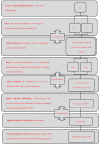Validation of the Spanish Version of the Double Knowledge Expectations and Received Knowledge Significant Other Scale for Informal Caregivers of People with Dementia (KESO-DEM/RKSO-DEM)
- PMID: 35564708
- PMCID: PMC9104362
- DOI: 10.3390/ijerph19095314
Validation of the Spanish Version of the Double Knowledge Expectations and Received Knowledge Significant Other Scale for Informal Caregivers of People with Dementia (KESO-DEM/RKSO-DEM)
Abstract
Dementia is associated with cognitive decline. Becoming an informal caregiver raises questions, requiring information and support from health professionals to guide home care. A multicenter, longitudinal study was carried out to validate the Spanish version of the double scale of expected and received knowledge for informal caregivers of people with dementia (KESO-DEM/RKSO-DEM), the analysis of the dimensional structure of the instrument, its validity and reliability, and temporary stability was carried out. An analysis of criterion and construct validity, internal consistency, and test−retest stability was performed. The evaluation of the interrelation between dimensions was statistically significant. Regarding internal consistency, the scale values were good both for the scale totals and for each dimension of knowledge, with Cronbach’s alpha coefficients of 0.97. For criterion validity, all items showed temporal stability for both questionnaires (p < 0.05). The availability of a valid, reliable tool for the measurement of expected and received knowledge in caregivers of people with dementia allows an approach based on the real needs of the family and the patient. It is important to design care protocols for people with dementia that are adapted to their needs and expectations and to their non-curative treatment, to improve the emotional well-being of patients and informal caregivers.
Keywords: dementia; informal caregivers; nurse; questionnaire validation.
Conflict of interest statement
The authors declare no conflict of interest.
Figures
Similar articles
-
Assessment of the validity of the Resilience and Strain Questionnaire in Caregivers of People with Dementia (ResQ-Care-Dem): a cross-sectional survey study.BMJ Open. 2025 May 22;15(5):e088738. doi: 10.1136/bmjopen-2024-088738. BMJ Open. 2025. PMID: 40404320 Free PMC article.
-
Validity and reliability of the Spanish caregiver reaction assessment scale for caregivers of people with dementia.Int J Nurs Pract. 2021 Aug;27(4):e12848. doi: 10.1111/ijn.12848. Epub 2020 Jun 1. Int J Nurs Pract. 2021. PMID: 32476205
-
Reliability, validity and relevance of needs assessment instruments for informal dementia caregivers: a psychometric systematic review.JBI Evid Synth. 2020 Apr;18(4):704-742. doi: 10.11124/JBISRIR-2017-003976. JBI Evid Synth. 2020. PMID: 32813339 Free PMC article.
-
[Development of the behaviour observation scale for psychomotor therapy for elderly people with dementia (BPMT-dem). Reliability and concurrent validity].Tijdschr Gerontol Geriatr. 2007 May;38(2):88-99. Tijdschr Gerontol Geriatr. 2007. PMID: 17605286 Dutch.
-
Remotely delivered information, training and support for informal caregivers of people with dementia.Cochrane Database Syst Rev. 2021 Jan 4;1(1):CD006440. doi: 10.1002/14651858.CD006440.pub3. Cochrane Database Syst Rev. 2021. PMID: 33417236 Free PMC article.
Cited by
-
Knowledge and attitudes toward mild traumatic brain injury among patients and family members.Front Public Health. 2024 May 24;12:1349169. doi: 10.3389/fpubh.2024.1349169. eCollection 2024. Front Public Health. 2024. PMID: 38855450 Free PMC article.
References
-
- Frías C.E., Garcia-Pascual M., Montoro M., Ribas N., Risco E., Zabalegui A. Effectiveness of a psychoeducational intervention for caregivers of People with Dementia with regard to burden, anxiety and depression: A systematic review. J. Adv. Nurs. 2020;76:787–802. doi: 10.1111/jan.14286. - DOI - PubMed


